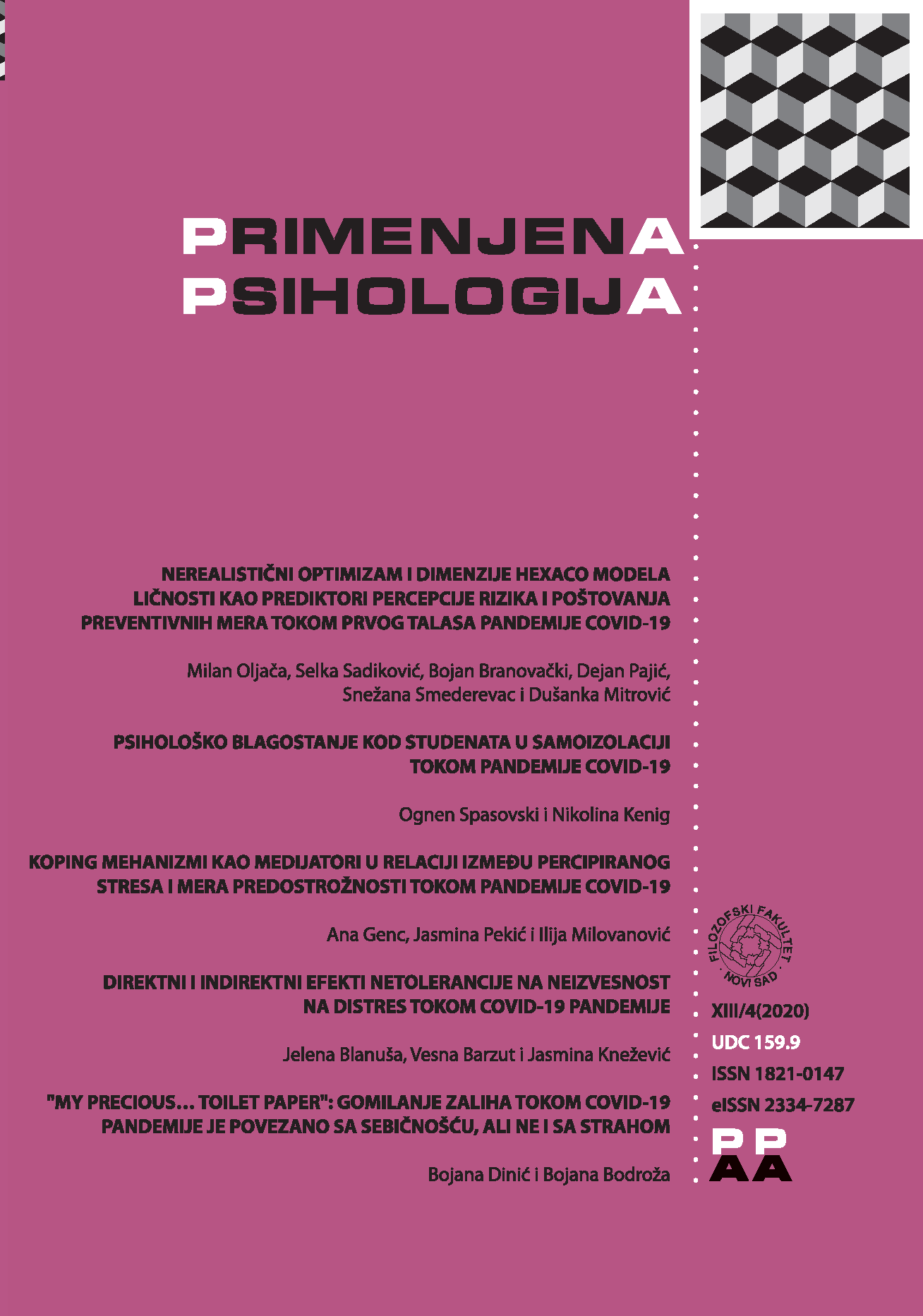Direktni i indirektni efekti netolerancije na neizvesnost na distres tokom COVID-19 pandemije
DOI:
https://doi.org/10.19090/pp.20.4.473-487Ključne reči:
COVID-19, distress, medijska izloženost, netolerancija na neizvesnost, strahApstrakt
Pandemija izazvana koronavirusom uticala je na celokupnu populaciju, izazivajući kod mnogih pojedinaca, indirektno ili direktno pogođenih, povišeni nivo distresa. Takva globalna kriza mentalnog zdravlja zahteva identifikaciju ključnih mehanizama koji dovode do povećanog distresa tokom pandemije. Specifičnost početka COVID-19 pandemije ogledala se u nedostatku informacija i, posledično, u visokom nivou procenjene neizvesnosti. Glavni cilj ovog istraživanja bio je ispitivanje efekta netolerancije na neizvesnost na doživljeni nivo distresa tokom pandemije. Dodatno, ispitivan je i posredni efekat medijske izloženosti, kao i straha u vezi sa COVID-19 infekcijom. Ukupno 740 ispitanika učestvovalo je u online istraživanju na početku pandemije u Republici Srbiji. U našem uzorku izmeren je umereno visok nivo distresa. Približno ⅓ ispitanika bila je u svakoj grupi: bez distresa, umereno visok i veoma povišen nivo distresa. Rezultati analize serijalne medijacije pokazali su da netolerancija na neizvesnost ima značajan direktan efekat na distres, ali i indirektan, preko straha od COVID-19 infekcije i preko medijske izloženosti. Viši nivo netolerancije na neizvesnost povezan je sa većom količinom vremena provedenom u traženju informacija u medijima i, nadalje, sa višim strahom i višim nivoom distresa. Pokazano je, takođe, da je medijska izloženost povezana sa povećanim nivoom straha od virusa. Ovakvi rezultati ukazuju na važnost nedvosmislenog i jasnog informisanja tokom krize, koje ima potencijal da smanji neizvesnost, i pružaju praktične implikacije za medije i državne institucije.
Reference
Balaratnasingam, S., & Janca, A. (2006). Mass hysteria revisited. Current Opinion in Psychiatry, 19, 171–174. https://doi.org/10.1097/01.yco.0000214343.59872.7a
Boswell, J. F., Thompson‐Hollands, J., Farchione, T. J., & Barlow, D. H. (2013). Intolerance of uncertainty: A common factor in the treatment of emotional disorders. Journal of Clinical Psychology, 69(6), 630–645. https://doi.org/10.1002/jclp.21965
Carleton, R. N., Mulvogue, M. K., Thibodeau, M. A., McCabe, R. E., Antony, M. M., & Asmundson, G. J. (2012). Increasingly certain about uncertainty: Intolerance of uncertainty across anxiety and depression. Journal of Anxiety Disorders, 26(3), 468–479. https://doi.org/10.1016/j.janxdis.2012.01.011
Dugas, M. J., Hedayati, M., Karavidas, A., Buhr, K., Francis, K., & Phillips, N. A. (2005). Intolerance of uncertainty and information processing: Evidence of biased recall and interpretations. Cognitive Therapy and Research, 29(1), 57–70. https://doi.org/10.1007/s10608-005-1648-9
Ferreira, D. C. S., Oliveira, W. L., Delabrida, Z. N. C., Faro, A., & Cerqueira-Santos, E. (2020). Intolerance of uncertainty and mental health in Brazil during the Covid-19 pandemic. Suma Psicológica, 27(1), 62–69. https://doi.org/10.14349/sumapsi.2020.v27.n1.8
Gabor, C., Törő, K. D., Mokos, J., Sándor, R., Éva, H., Andrea, K., & Rita, F. (2020). Examining perceptions of stress, wellbeing and fear among Hungarian adolescents and their parents under lockdown during the COVID-19 pandemic. PsyArXiv Preprints. doi:10.31234/osf.io/feth3
Garfin, D. R., Silver, R. C., & Holman, E. A. (2020). The novel coronavirus (COVID-2019) outbreak: Amplification of public health consequences by media exposure. Health Psychology, 39(5), 355–357. https://doi.org/10.1037/hea0000875
Hayes, A. F. (2018). Introduction to mediation, moderation, and conditional process analysis: a regression-based approach. Guilford Publications.
Holman, E. A., Garfin, D. R., & Silver, R. C. (2014). Media’s role in broadcasting acute stress following the Boston Marathon bombings. Proceedings of the National Academy of Sciences, 111(1), 93–98. https://doi.org/10.1073/pnas.1316265110
Jungmann, S. M., & Witthöft, M. (2020). Health anxiety, cyberchondria, and coping in the current COVID-19 pandemic: Which factors are related to coronavirus anxiety?. Journal of Anxiety Disorders, 73, 102239. https://doi.org/10.1016/j.janxdis.2020.102239
Kalaj, V., Jelic, D., Berat, N., & Popov, B. (2011). What predicts positive and negative work-related stress indicators? Test of organizational health model. Primenjena psihologija, 4(3), 279–294. https://doi.org/10.19090/pp.2011.3.279-294
Knežević, J. (2015). Uloga bazičnih psiholoških potreba i samoregulacije u prevladavanju percepcije nestabilnosti zaposlenja [The role of basic psychological needs and self-regulation in coping with the job instability perception]. Unpublished doctoral dissertation. University of Novi Sad, Faculty of Philosophy.
Lin, C. Y., Broström, A., Griffiths, M. D., & Pakpour, A. H. (2020). Investigating mediated effects of fear of COVID-19 and COVID-19 misunderstanding in the association between problematic social media use, psychological distress, and insomnia. Internet interventions, 21, 100345. https://doi.org/10.19090/pp.2011.3.279-294
Maddux, J. E., & Rogers, R. W. (1983). Protection motivation and self-efficacy: A revised theory of fear appeals and attitude change. Journal of Experimental Social Psychology, 19(5), 469–479. https://doi.org/10.1016/0022-1031(83)90023-9
Mertens, G., Gerritsen, L., Duijndam, S., Salemink, E., & Engelhard, I. M. (2020). Fear of the coronavirus (COVID-19): Predictors in an online study conducted in March 2020. Journal of Anxiety Disorders, 74, 102258. https://doi.org/10.1016/j.janxdis.2020.102258
Mihić, L., Sokić, J., Samac, N., & Ignjatović, I. (2014). Srpska adaptacija i validacija upitnika netolerancije na neizvesnost [Serbian adaptation and validation of the intolerance of uncertainty scale]. Primenjena psihologija, 7(3-1), 347–370. https://doi.org/10.19090/pp.2014.3-1.347-370
Milne, S., Orbell, S., & Sheeran, P. (2002). Combining motivational and volitional interventions to promote exercise participation: Protection motivation theory and implementation intentions. British Journal of Health Psychology, 7(2), 163–184. https://doi.org/10.1348/135910702169420
Satici, B., Saricali, M., Satici, S. A., & Griffiths, M. D. (2020). Intolerance of uncertainty and mental wellbeing: serial mediation by rumination and fear of COVID-19. International Journal of Mental Health and Addiction. https://doi.org/10.1007/s11469-020-00305-0
Sokić, J., Samac, N., Bošković, I., & Mihić, Lj. (maj, 2012). Konstrukt validnost upitnika Netolerancija na neizvesnost (IUS) [Construct validity of Intolerance of Uncertainty Scale (IUS)]. 60. Naučno-stručni skup psihologa Srbije, Filozofski fakultet u Beogradu.
Taha, S., Matheson, K., Cronin, T., & Anisman, H. (2014). Intolerance of uncertainty, appraisals, coping, and anxiety: The case of the 2009 H 1 N 1 pandemic. British Journal of Health Psychology, 19(3), 592–605.
Terluin, B., van Rhenan, W., Schaufeli, W. B., & de Haan, M. (2004). The Four-Dimensional Symptom Questionnaire (4DSQ): measuring distress and other mental health problems in a working population. Work & Stress, 18(3), 187−207. https://doi.org/10.1080/0267837042000297535
Trnka, R., & Lorencova, R. (2020). Fear, anger, and media-induced trauma during the outbreak of COVID-19 in the Czech Republic. Psychological Trauma: Theory, Research, Practice, and Policy, 12(5), 546−549. https://doi.org/10.1037/tra0000675
Voitsidis, P., Gliatas, I., Bairachtari, V., Papadopoulou, K., Papageorgiou, G., Parlapani, E., Syngelakis, M., Holeva, V. & Diakogiannis, I. (2020). Insomnia during the COVID-19 pandemic in a Greek population. Psychiatry Research, 289, 113076. https://doi.org/10.1016/j.psychres.2020.113076
World Health Organization (2020). Timeline: WHO's COVID-19 response. Retrived from https://www.who.int/emergencies/diseases/novel-coronavirus-2019/interactive-timeline








